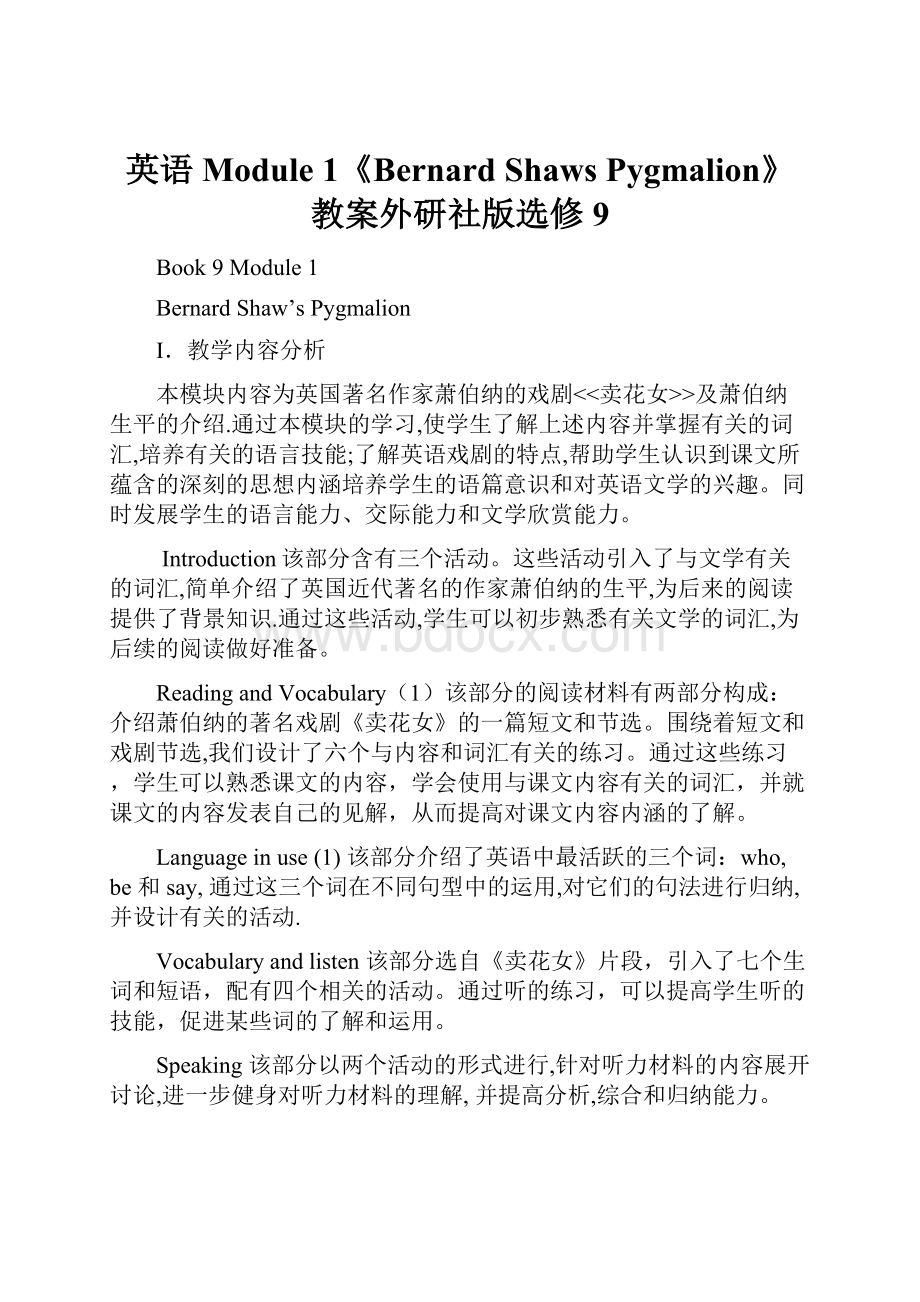英语Module 1《Bernard Shaws Pygmalion》教案外研社版选修9.docx
《英语Module 1《Bernard Shaws Pygmalion》教案外研社版选修9.docx》由会员分享,可在线阅读,更多相关《英语Module 1《Bernard Shaws Pygmalion》教案外研社版选修9.docx(16页珍藏版)》请在冰豆网上搜索。

英语Module1《BernardShawsPygmalion》教案外研社版选修9
Book9Module1
BernardShaw’sPygmalion
I.教学内容分析
本模块内容为英国著名作家萧伯纳的戏剧<<卖花女>>及萧伯纳生平的介绍.通过本模块的学习,使学生了解上述内容并掌握有关的词汇,培养有关的语言技能;了解英语戏剧的特点,帮助学生认识到课文所蕴含的深刻的思想内涵培养学生的语篇意识和对英语文学的兴趣。
同时发展学生的语言能力、交际能力和文学欣赏能力。
Introduction该部分含有三个活动。
这些活动引入了与文学有关的词汇,简单介绍了英国近代著名的作家萧伯纳的生平,为后来的阅读提供了背景知识.通过这些活动,学生可以初步熟悉有关文学的词汇,为后续的阅读做好准备。
ReadingandVocabulary
(1)该部分的阅读材料有两部分构成:
介绍萧伯纳的著名戏剧《卖花女》的一篇短文和节选。
围绕着短文和戏剧节选,我们设计了六个与内容和词汇有关的练习。
通过这些练习,学生可以熟悉课文的内容,学会使用与课文内容有关的词汇,并就课文的内容发表自己的见解,从而提高对课文内容内涵的了解。
Languageinuse
(1)该部分介绍了英语中最活跃的三个词:
who,be和say,通过这三个词在不同句型中的运用,对它们的句法进行归纳,并设计有关的活动.
Vocabularyandlisten该部分选自《卖花女》片段,引入了七个生词和短语,配有四个相关的活动。
通过听的练习,可以提高学生听的技能,促进某些词的了解和运用。
Speaking该部分以两个活动的形式进行,针对听力材料的内容展开讨论,进一步健身对听力材料的理解,并提高分析,综合和归纳能力。
Languageinuse
(2)该部分继续介绍了英语中最活跃的三个词:
a/an,you和good,通过这三个词在不同句型中的运用,对它们的句法进行归纳.
Readingandvocabulary
(2)该部分阅读材料主要介绍《买花女》中的两个人物以及她们的外貌和性格特征变化。
通过课文所提供的一系列的活动来加深对课文的理解,并为后续的阅读练习做好铺垫。
Readingpractice该部分的活动内容为:
Eliza在一天之内出席了一个花园宴会、一个正式的晚宴和一个晚间招待会,回到Higgins的家中以后,筋疲力尽。
她在那些活动中变现完美,没有露出一点破绽,为他打赢了他的赌,为此她付出了巨大的努力并且承受了极大的心理压力。
通过阅读人物的一系列变化,更加深入的了解课文,并对进一步掌握本单元的生词有巨大的帮助。
CulturalCorner该部分节选萧伯纳<<卖花女>>的最后一幕。
读后可以帮助学生加深对该戏剧的理解,并能使学生对英语戏剧的特点有了更多的了解。
II.教学计划
本模块分为五个课时:
第一课时:
Introduction,Presentationskill,CulturalCorner
第二课时:
ReadingandVocabulary
(1)
第三课时:
Languageinuse
(1)&
(2)
第四课时:
ReadingandVocabulary
(2),
第五课时:
Readingpractice,Task,ModuleFile
.Learningstrategy:
1.Cognitivestrategy(认知策略)
2.Monitoringstrategy(调控策略)
3.communicationstrategy(交际策略)
4.resourcestrategy(资源策略)
IV.教学步骤
PeriodOne
Content:
Introduction,Speaking.CulturalCorner
Procedure:
introduction
Step1:
引领学生熟悉Activity1中的单词,注意发音和意思.
Completethequotationswiththewordsinthebox
badlycreatingdonejokelanguagelaughlikemouth
1.TheEnglishhavenorespectforthelanguage,andwillnotteachtheirchildrentospeakit.Theyspellitsobadlythatnomancanteachhimselfwhatitsoundslike.ItisimpossibleforanEnglishmantoopenhismouthwithoutmakinganotherEnglishmanhatehim.
2.Lifeisn’taboutfindingyourself.Lifeisaboutcreatingyourself
3.Ifyouaregoingtotellpeoplethetruth,you’dbettermakethelaugh.Otherwise,theywillkillyou.
4.Mywayofjokingistotellthetruth.It’sthefunniestjokeintheword.
5.Nothingiseverdoneinthisworlduntilmenarepreparetokilloneanotherifitisnotdone.
6.Takecaretogetwhatyoulikeoryouwillhavetolikewhatyouget.
Step2了解词汇之后,给出学生几分钟时间来编个小故事,尽量用上与上述有关的单词.
Step3首先找学生阅读Activity3中的单词,并让学生了解词的意思.阅读下面文章了解萧伯纳,并回答下面的问题。
1.Whatdoesadramatistdo?
2.Whatkindofthingsdoesasocialistbelieve?
3.WhatkindofplaydidShowwrite?
Presentationskill---Givingapresentation
Step1:
做Activity1,使学生掌握描述人物外貌的词语:
(1)个别活动,阅读文章,完成Activity1中的表格
(2)全班活动,请几名同学说出答案,然后大家给出意见.
Step2:
完成Activity2,使学生掌握描述人物性格和外貌的词语.
Step3:
Pairwork.四个学生一组,在老师的指导下来描述自己所熟悉的人物性格,把讨论的结果记录下来.学生们可以借鉴如下表达方式:
Sb.befamiliarwith…/sth.befamiliartosb./I’dliketopresentmyfriend____toyou./I’veknownhim/herfor____years./she/heisquite…..
CulturalCorner:
Purpose:
揭示上层社会用金钱来衡量人的标准.
1.Skimming
AskSstogothroughthepassagequickly,andthentrytofindouttheanswerstothefollowingquestions?
(1)Whydoesn’tDoolittleenjoyhavingmoney?
(2)DoyouagreethatordinarypeopleliveforothersandnotforthemselvesinChina?
SuggestedAnswer:
(1).Becauseeverybodywantshimtogivethemmoney,orusetheirpaidservice.
(2).Students’ownanswers.
2.Discussion
AskstudentstodiscussthepersonalityofDoolittle.Tryyourbesttousethesentencepatterninthismodule.
SuggestedAnswers:
Variousanswersareacceptable.
PeriodTwo
Content:
ReadingandVocabulary
(1)
TeachingGoals:
1.TogetSstomasterthereadingskillsofscanningandskimming.
2.Knowtheplay—MyFairLady
TeachingProcedures:
Step1.Leading-in播放<<卖花女>>的录像,导入本模块的课文.
Step2.Readthepart1andpart2ofthepassagequicklyandanswerthequestions.(目的是让学生学会速读,并从中获取更多的信息)
1.WhyistheplaycalledPygmalion?
2.WhatdoesHigginswantodowithEliza?
3.HowdoesElizachange?
4.DoesHigginsbelievethatcomingfromahighsocialclassgivesyouabettercharacter?
Why?
5.HowdoesHigginstreatEliza?
6.HowdoesElizawinhisrespect?
Step3:
Afteryourreading,Maybeyoushouldpaymoreattentiontothesenewwords
1.…aking….carvesastatue.makes
2.Thestatuecomestolife….becomealive
3.….triestomakealadyoutofangirlawomanwhobelongstoahighersociety
4.…tobelieveinarefinedway…inapoliteandeducatedway
5.HigginsintroducesElizatoapolitesocietypeopleinthehighestclassesofsociety
6.Iwon’tgivemorethanashillingasmallamountofmoney
Step4Completethesentenceswiththecorrectformofthewordsinthebox
appearancebasebetcharmingdomineeringmyth
professorproverebelstatue
1.Hebetalotofmoneythathewouldwin.
2.Amythisanancienttraditionalstoryaboutgods,magicandheroes.
3.Statuesareoftenmadeofstone.
4.Sheischarmingthateveryonewantstobeherfriend.
5.Youngpeoplesometimesrebelagainsttheirparents.
6.TheprofessorhaswrittenabrilliantbookaboutBernardShow.
7.Beingextremelytallandthin,hisappearancewasratherstrange.
8.Higginswantstoprovethatheisevents.
9.Playsandnovelsareoftenbasedonrealevents.
10.Adomineeringpersonwantsotherpeopletodowhattheysay.
Step5Readpart1again.Choosethecorrectanswers.
1.IntheGreekstory,thekingPygmalionfallsinlovewith_______.
A.astatueB.awomanC.amyth
2.Higginsis_______thanEliza.
A.ofahighersocialclassB.abetterhumanbeingC.nicer
3.TheprofessorbelieveshecanchangeEliza’s___________.
A.voiceB.characterC.behaviour
4.Eliza_______inwaysthatHigginsdoesnotexpect.
A.speaksB.changesC.helps
5.ElizaleavesHigginsbecause______.
A.hetreatsherbadlyB.heseesherasaservantC.hedoesn’tloveher
6.Intheend,ElizamakesHiggins_______her.
A.teachB.helpC.respect
Step6.Readthepart2againandanswerthequestions
1.Elizawantslessonsinorderto________.
A.workinaflowershopB.buyaflowershopC.buyflowersinaflowershop
2.HowmuchdoesElizatellHigginsshewillpayforlessons?
A.lessthanashillingB.exactlyoneshillingC.morethanashilling
3.HigginsagreestoteacherElizabecause_______.
A.helikesherB.heseesitasachallengeC.sheissodirty
4.PickeringbelievesthatHiggins________.
A.canmakeElizaaladyB.shouldmakeElizaaladyC.can’tmakeElizalady
Step7Discussion
Doyouthinkthe“bet”isagoodidea?
Whyorwhynot?
PeriodThree
Content:
Languageinuse
(1)&
(2)
TeachingGoals:
1.Knowtheactivewords:
who/tobe/say/a(an)/you/good
2.theuseofthewordsandphrases
TeachingProcedures:
Languageinuse
(1)
Who
Readthesentencesandanswerthequestions
1.WhoisPickering?
2.WhooffersHigginsmoneyforlessons?
3.WhodoesElizaaskforlesson?
4.Doyouknowwhowillwinthebet?
5.Elizamarriesayoungmanwhoreallycaresforher.
6.Elizamarriesayoungmanwhoshelikesalot.
7.Higgins,whoisaprofessorofEnglish,isnotveryinterestedinpeople.
8.I’vealreadydecidedwhowillwinthebet.
Whichsentences…….
(a)asksaboutthepersonwhoistheobjectofaverb?
(b)asksabouttheidentityofsomeone?
(c)identifytheexactpersonyouaretalkingabout?
(d)givesextrainformationaboutthepersonyouaretalkingabout?
(e)askswhichpersondoessomething?
(f)haveaverbbeforethewordwho?
(g)asksanindirectquestion,perhapsinordertobepolite?
答案:
(a)-3(b)-1(c)-5,6(d)-7(e)-2(f)-4,8(g)-4
具体用法:
用法
用法举例
常用句型
Who+动词
Whatphoned?
疑问句/陈述句+who+动词
常用于本句型的动词:
know,decide,mention,say,ask,wonder,care,remember,tell,see等
Doyouknowwhowon?
Idon’tknowwhowon.
名词/代词+who+动词
常用于本句型的名词或代词有:
those,people,someone,anyone,man,woman,person
(1)Idon’tlikethatmanwhoreadsthenews.
(2)Thepersonwhoisinchargeisnothertoday.
Who代替传统语法中的whom的功能
Whodoyouprefer?
名词+who+动词
James,whodiedinacarcrash,wasasinger.
固定用法
Whoknow?
=Nooneknows
⏹whoisJohn?
⏹Whoknows?
Shecouldbeanywhere.
Whocars?
=Idon’tcare
⏹You’llbreakthechair.
⏹Whocars?
Itisoldanywhere
Tobe
Matchthesentenceswiththegrammarpatterns
1.Don’tbesorudetoEliza!
2.Higginsmaybesuccessfulinhisplan
3.Iwanttobeladyinaflowershop
4.Eliza’sclotheswillbecleanedbyMrsPearce.
5.“MrsHiggins,Elizawillbestayingwithusforsomemonths,”saidHiggins.
(a)modalverb(e.g.must,can,should,will)
(b)be+adj.ornonephrase
(c)modalverb+being+V-ing
(d)verb+tobe
(e)modalverb+be+V-ed
答案:
a-2b-1c-5d-3e-4
具体用法
用法
用法举例
常用句型
Be+形容词/名词
Becareful.You’llfall
Don’tbesilly
情态动词+(not)be
Johnmust(not)beinhisforties
情态动词+(not)be+V-ng/V-ed
Itmayberainingoutside
Theseglassesshouldbewashed
动词+tobe常用于本句型的动词有:
want,like,intend,prefer,refuse…
Whenshegrowsup,shewantstobeanarchitect.
固定用法
Let…be建议某人不要改变原状
Iwouldjustletthembe
As…as..can/couldbe=asmuchaspossible
Nowthatshehasherownhome,she’sashappyascanbe
Say
Matchthesentenceswiththeexpressions
1.MrsPercedoesn’tsayverymuch
2.Elizasaidthatshewantedtobealadyinaflowershop
3.DoesElizasaywhyshewantslesson?
4.Pickeringsays,”You’renotexactlypolitetoher.”
5.“Willyouacceptthechallenge?
”“yes,I’vealreadysaidso.”
6.Itisoftensaidthatthewayyouspeakisimportant.
7.PygmalionissaidtobeShow’smostpopularplay.
Sayis;
a.usedtoreportstatementsoropinionsi